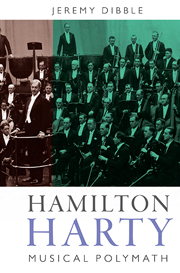Book contents
- Frontmatter
- Dedication
- Contents
- List of Illustrations
- List of Music Examples
- Preface
- Abbreviations
- Epigraph
- 1 1879–1901 Hillsborough, Belfast and Dublin: A Musical Apprenticeship
- 2 1901–9 London (1): A Pre-eminent ‘Collaborator’ and Aspiring Composer
- 3 1909–14 London (2): Composer and Conductor
- 4 1914–20 The War Years and After
- 5 1920–27 The Hallé Years
- 6 1927–33 Apogee: From Hallé to the LSO
- 7 1933–6 America and Australia: An Unforeseen Romance
- 8 1936–41 The Last Years: The Children of Lir – A Creative Codicil
- APPENDIX 1 List of Works
- APPENDIX 2 List of Recordings
- Bibliography
- Index of Harty's Works
- General Index
- Music in Britain, 1600–2000
Preface
Published online by Cambridge University Press: 05 December 2013
- Frontmatter
- Dedication
- Contents
- List of Illustrations
- List of Music Examples
- Preface
- Abbreviations
- Epigraph
- 1 1879–1901 Hillsborough, Belfast and Dublin: A Musical Apprenticeship
- 2 1901–9 London (1): A Pre-eminent ‘Collaborator’ and Aspiring Composer
- 3 1909–14 London (2): Composer and Conductor
- 4 1914–20 The War Years and After
- 5 1920–27 The Hallé Years
- 6 1927–33 Apogee: From Hallé to the LSO
- 7 1933–6 America and Australia: An Unforeseen Romance
- 8 1936–41 The Last Years: The Children of Lir – A Creative Codicil
- APPENDIX 1 List of Works
- APPENDIX 2 List of Recordings
- Bibliography
- Index of Harty's Works
- General Index
- Music in Britain, 1600–2000
Summary
In the late nineteenth century the province of Ulster provided the world with its fair share of musical talent in the contrasting personalities of Charles Wood, Hamilton Harty, Herbert Hughes and Norman Hay. Arguably the most gifted of these was Harty, who, in my view, together with the Dublin-born Stanford, shared that remarkable ‘spark’ of natural talent, technically and inspirationally. Both pursued success in England and left their mark on the history of British music, but drew much of their character from the land of their birth. Having also completed studies of Charles Villiers Stanford, perhaps the greatest and most accomplished of all Irish composers, and Michele Esposito, the Neapolitan pianist and composer who made his home in Dublin for forty-six years, I thought it fitting to assess Harty in both his British and Irish contexts, and, regarding the latter, to appraise his identity within the sphere of Irish cultural nationalism. Born in Hillsborough, largely self-taught, he came under the wing of Esposito in Dublin before migrating to London. A great admirer of Stanford, Harty ploughed his own Irish furrow as a composer, but showed an extraordinary versatility as a brilliant accompanist – to some the finest these islands have ever produced – and as one of that dazzling catalogue of British conductors in the 1920s and 30s who achieved international standing. In this sense Harty's combination of abilities has probably never been equalled.
- Type
- Chapter
- Information
- Hamilton HartyMusical Polymath, pp. xi - xivPublisher: Boydell & BrewerPrint publication year: 2013



